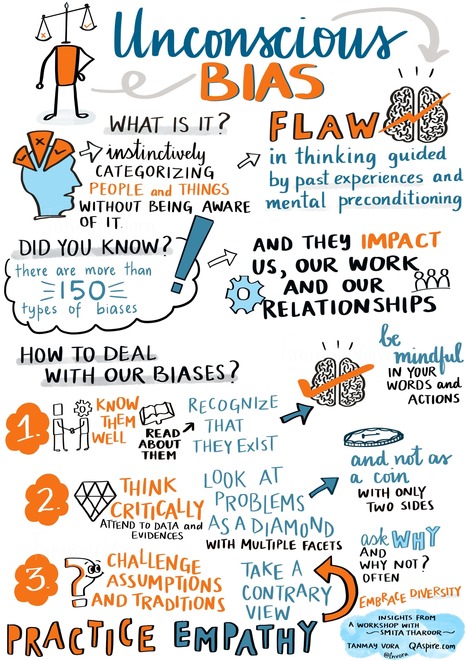Being Conscious About Our Unconscious Biases
I attended a very interesting workshop a few weeks ago on the topic of “Unconscious Bias” facilitated by Smita Tharoor. I was interested in this topic because I explored the intersection of critical thinking and leadership a few years ago. This was a good opportunity to get back to the topic and add to my understanding.
What is Unconscious Bias
The term ‘cognitive bias’ was coined by Amos Tversky and Daniel Kahneman in 1972 which quite simply means “our tendency to filter information, process facts and arrive at judgments based on our past experiences, likes/dislikes and automatic influences.”
How do these biases show up in Leadership?
A lot of leadership is about taking decisions involving group of people. Instinctive leaders often tend to decide quickly based on limited information or experience they have at hand. The result is that they end up taking wrong decisions (which may have worked for them in past but may not work in a different context), or discriminating with people of a certain color, race, sex or nationality based on their past experiences with similar people. At work, biases (or the perception of bias) is the biggest contributor to people disengagement and cost of disengagement is huge. Lack of critical thinking also leads to short-termism where decisions are taken for immediate gains and solutions of today become thorny problems of tomorrow.
==============================================
Look for the contrary. It helps playing a devil’s advocate and taking a contrarian view of things. It not only challenges others to think harder but also helps you in really understanding if they are just defending their own biases.
==============================================
In common parlance, a devil's advocate is someone who, given a certain argument, takes a position they do not necessarily agree with (or simply an alternative position from the accepted norm), for the sake of debate or to explore the thought further.
==============================================
Learn more / En savoir plus / Mehr erfahren:
https://www.scoop.it/t/21st-century-learning-and-teaching/?&tag=LeaderShip
https://www.scoop.it/t/21st-century-learning-and-teaching/?&tag=Devil%27s+advocate



 Your new post is loading...
Your new post is loading...








I attended a very interesting workshop a few weeks ago on the topic of “Unconscious Bias” facilitated by Smita Tharoor. I was interested in this topic because I explored the intersection of critical thinking and leadership a few years ago. This was a good opportunity to get back to the topic and add to my understanding.
What is Unconscious Bias
The term ‘cognitive bias’ was coined by Amos Tversky and Daniel Kahneman in 1972 which quite simply means “our tendency to filter information, process facts and arrive at judgments based on our past experiences, likes/dislikes and automatic influences.”
How do these biases show up in Leadership?
A lot of leadership is about taking decisions involving group of people. Instinctive leaders often tend to decide quickly based on limited information or experience they have at hand. The result is that they end up taking wrong decisions (which may have worked for them in past but may not work in a different context), or discriminating with people of a certain color, race, sex or nationality based on their past experiences with similar people. At work, biases (or the perception of bias) is the biggest contributor to people disengagement and cost of disengagement is huge. Lack of critical thinking also leads to short-termism where decisions are taken for immediate gains and solutions of today become thorny problems of tomorrow.
==============================================
Look for the contrary. It helps playing a devil’s advocate and taking a contrarian view of things. It not only challenges others to think harder but also helps you in really understanding if they are just defending their own biases.
==============================================
In common parlance, a devil's advocate is someone who, given a certain argument, takes a position they do not necessarily agree with (or simply an alternative position from the accepted norm), for the sake of debate or to explore the thought further.
==============================================
Learn more / En savoir plus / Mehr erfahren:
https://www.scoop.it/t/21st-century-learning-and-teaching/?&tag=LeaderShip
https://www.scoop.it/t/21st-century-learning-and-teaching/?&tag=Devil%27s+advocate